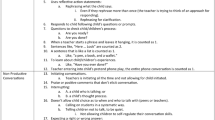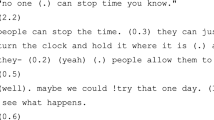Abstract
While preschool educators are currently encouraged to educate young children in and for sustainable development, limited observational research has focused on documenting how sustainability notions are introduced or discussed in preschools. Drawing on a large database of videos of practice, this study describes typical features of conversations about sustainability in Singapore Kindergarten 1 classrooms (4–5 years). Four representative conversations (two planned, two incidental) are qualitatively analyzed to illustrate the strengths and weaknesses of preschool educators’ pedagogical moves. The analyses indicate that while educators build upon children’s experiences and provide real-life examples, their interactional styles tend to be direct, prescriptive, and somewhat rigid. The study, therefore, raises awareness among early childhood practitioners about the need for more dialogic forms of interaction. Children need increased opportunities to have a voice in conversations about sustainability issues. Facilitating deeper discussions will require preschool educators to position themselves as co-constructors of knowledge, attitudes, and behaviors for a more sustainable future, rather than as mere transmitters of information.
Résumé
Bien que les éducateurs du préscolaire soient présentement encouragés à éduquer les jeunes enfants au développement durable, peu d’études d’observation ont visé à documenter comment les notions de durabilité sont présentées ou discutées en maternelle. S’appuyant sur une vaste banque de données de vidéos de pratique, cette étude décrit des caractéristiques typiques de conversations sur le développement durable en maternelle 1 (4–5 ans) à Singapour. Quatre conversations représentatives (deux planifiées, deux fortuites) sont analysées qualitativement pour illustrer les forces et les faiblesses des gestes pédagogiques des éducateurs. Il s’en dégage que bien que les éducateurs s’appuient sur les expériences des enfants et donnent des exemples tirés de la vie réelle, le style de leurs interactions tend à être direct, prescriptif et quelque peu rigide. En conséquence, l’étude alerte les praticiens de la jeune enfance au besoin de développer des formes d’interaction plus dialogiques. Les enfants ont besoin d’avoir plus d’occasions d’avoir la parole dans les conversations sur les questions de développement durable. Favoriser des discussions plus profondes requiert des éducateurs de se positionner comme co-constructeurs du savoir, des attitudes et des comportements en vue d’un avenir durable, plutôt que de se voir comme de simples transmetteurs d’information.
Resumen
Actualmente se espera que los maestros de educación infantil comiencen a educar a los niños en y para un desarrollo sostenible. Sin embargo, existe poca investigación observacional centrada en documentar cómo las nociones relacionadas con la sostenibilidad son presentadas o discutidas en escuelas infantiles. Con base en una amplia colección de videos de práctica, este estudio describe las características típicas de las conversaciones sobre sostenibilidad en clases de Kindergarten 1 en Singapur (4–5 años). Cuatro conversaciones representativas (dos planeadas, dos incidentales) son analizadas cualitativamente para ilustrar los puntos fuertes y débiles en las estrategias pedagógicas de las educadoras participantes. Los análisis indican que, mientras que las educadoras construyen sobre las experiencias previas de los niños y ofrecen ejemplos cotidianos, su estilo de interacción tiende a ser directo, prescriptivo y relativamente rígido. El estudio, por tanto, pretende crear conciencia entre los profesionales de la educación infantil sobre la necesidad de formas de interacción más dialógica. Los niños necesitan crecientes oportunidades para expresar su propia voz en conversaciones sobre sostenibilidad. Facilitar conversaciones más profundas requerirá que los educadores infantiles se posicionen como co-constructores de conocimientos, actitudes, y comportamientos para un futuro más sostenible, en vez de como meros transmisores de información.
Similar content being viewed by others
References
Bautista, A., Ng, S.-C., Múñez, D., & Bull, R. (2016). Learning areas for holistic education: Kindergarten teachers’ curriculum priorities, professional development needs, and beliefs. International Journal of Child Care and Education Policy, 10(8), 1–18. https://doi.org/10.1186/s40723-016-0024-4.
Borg, F., Winberg, M., & Vinterek, M. (2017). Children’s learning for a sustainable society: Influences from home and preschool. Education Inquiry, 8(2), 151–172.
Cazden, C. (2001). Classroom discourse: The language of teaching and learning (2nd ed.). Portsmouth: Heinemann Educational Books Inc.
Davis, J. (2009). Revealing the research ‘hole’ of early childhood education for sustainability: A preliminary survey of the literature. Environmental Education Research, 15(2), 227–241.
Deans, J., & Brown, R. (2008). Reflection, renewal and relationship building: An ongoing journey in early childhood arts education. Contemporary Issues in Early Childhood, 9(4), 339–353.
Duncan, E. (2011). Report part 2—ESD in practice. Norway: OMEP.
Engdahl, I., & Rabušicová, M. (2011). Education for sustainable development in practice: World Organisation for Early Childhood Education (OMEP). http://old.worldomep.org/files/1343134_wa-report-omep-esd-in-practice-2011-1-.pdf. Accessed 1 June 2017.
European Panel on Sustainable Development (EPSD) (2010). Taking children seriously—How the EU can invest in early childhood education for a sustainable future. Retrieved from http://www.ufn.gu.se/digitalAssets/1324/1324488_epsd_report4.pdf. Accessed 15 May 2017.
Hedefalk, M., Almqvist, J., & Ostman, L. (2015). Education for sustainable development in early childhood education: A review of the research literature. Environmental Education Research, 21(7), 975–990.
Hsiao, C.-Y., & Shih, P.-Y. (2016). Exploring the effectiveness of picture books for teaching young children the concepts of environmental protection. International Research in Geographical and Environmental Education, 25(1), 36–49.
Inoue, M., O’Gorman, L., Davis, J., & Ji, O. (2017). An international comparison of early childhood educators’ understandings and practices in education for sustainability in Japan, Australia, and Korea. International Journal of Early Childhood. https://doi.org/10.1007/s13158-017-0205-5.
Lasen, M., Skamp, K., & Simoncini, K. (2017). Teacher perceptions and self-reported practices of education for sustainability in the early years of primary school: An Australian case study. International Journal of Early Childhood. https://doi.org/10.1007/s13158-017-0200-x.
Lee, L.-F., & Yelland, N. J. (2017). Crafting miniature students in the early years: Schooling for desirable childhoods in East Asia. International Journal of Early Childhood, 49(1), 39–56.
Lefstein, A., & Snell, A. (2014). Better than best practice: Developing teaching and learning through dialogue. London: Routledge.
Malandrakis, G. N. (2008). Children’s understandings related to hazardous household items and waste. Environmental Education Research, 14(5), 579–601.
Matusov, E. (2009). Journey into dialogic pedagogy. Hauppauge: Nova Science.
Ministry of Education (MOE) (2013). Nurturing early learners: A curriculum for kindergartens in Singapore. Discovery of the world. Retrieved from https://www.nel.sg/nel/slot/u566/Resources/Downloadable/pdf/nel-guide/nel-edu-guide-discovery-of-the-world.pdf. Accessed 14 Feb 2016.
Ogelman, H. G. (2012). Teaching preschool children about nature: A project to provide soil education for children in Turkey. Early Childhood Education Journal, 40(3), 177–185.
Pianta, R. C., La Paro, K. M., & Hamre, B. K. (2008). Classroom assessment scoring system (CLASS) manual, pre-K. Baltimore: Brookes Publishing Company.
Pramling Samuelsson, I., & Kaga, Y. (2008). The contribution of early childhood education to a sustainable society. Paris: UNESCO.
Prince, C. (2010). Sowing the seeds: Education for sustainability within the early years curriculum. European Early Childhood Education Research Journal, 18(3), 423–434.
Sandelowski, M. (1995). Sample size in qualitative research. Research in Nursing & Health, 18, 179–183.
Siraj-Blatchford, J., Mogharreban, C., & Park, E. (Eds.). (2016). International research on education for sustainable development in early childhood. Cham: Springer.
Siraj-Blatchford, J., Smith, K. C., & Pramling Samuelsson, I. (2010). Education for sustainable development in the early years. Gothenburg: OMEP.
Sylva, K., Melhuish, E., Sammons, P., Siraj-Blatchford, I., & Taggart, B. (2010). Early childhood matters: Evidence from the effective pre-school and primary education project. London: Routledge.
United Nations (UN) (1992). Agenda 21: Programme of action for sustainable development earth summit. Paper presented at the United Nations Conference on Environment and Development (UNCED), Rio de Janeiro (Brazil).
United Nations Educational, Scientific and Cultural Organization (UNESCO) (2007). The UN decade of education for sustainable development, 2005–2014: The first two years.
United Nations Educational, Scientific and Cultural Organization (UNESCO) (2014). Shaping the future we want: UN decade of education for sustainable development (2005–2014) final report.
von Braun, J. (2017). Children as agents of change for sustainable development. In A. M. Battro, P. Léna, M. Sánchez Sorondo, & J. von Braun (Eds.), Children and sustainable development: Ecological education in a globalized world. Dordrecht: Springer.
Wasik, B. A., & Hindman, A. H. (2013). Realizing the promise of open-ended questions. The reading teacher, 67(4), 302–311. https://doi.org/10.1002/trtr.1218.
Weldemariam, K., Boyd, D., Hirst, N., Sageidet, B. M., Browder, J. K., Grogan, L., et al. (2017). A critical analysis of concepts associated with sustainability in early childhood curriculum frameworks across five national contexts. International Journal of Early Childhood. https://doi.org/10.1007/s13158-017-0202-8.
Wells, G. (1999). Dialogic inquiry: Towards a sociocultural practice and theory of education. Cambridge: Cambridge University Press.
World Commission on Environment and Development (WCED). (1987). Our common future. Oxford: Oxford University Press.
Acknowledgements
This study was funded by the Education Research Funding Programme, National Institute of Education (NIE), Nanyang Technological University, Singapore, project no. OER 09/14RB. The views expressed in this paper are the author’s and do not necessarily represent the views of NIE.
Author information
Authors and Affiliations
Corresponding author
Rights and permissions
About this article
Cite this article
Bautista, A., Moreno-Núñez, A., Ng, SC. et al. Preschool Educators’ Interactions with Children About Sustainable Development: Planned and Incidental Conversations. IJEC 50, 15–32 (2018). https://doi.org/10.1007/s13158-018-0213-0
Published:
Issue Date:
DOI: https://doi.org/10.1007/s13158-018-0213-0




